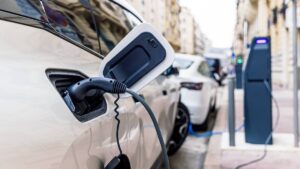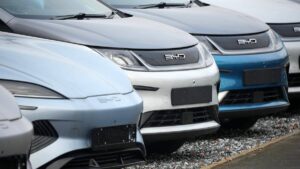VinFast, Die Young: Meet the new world’s third largest automaker by market cap, made in Vietnam

Via VinFast
Strap yourself in, non-believers.
It was China EV Week here at Stockhead, but honestly, what’s the point?
There’s been some unexpected movement in the super-fast evolving electric vehicle-maker universe. Money is pouring in, expectations are being dashed and egos are getting bruised.
Vinfast shares rose 20% in the US market on Monday and its market cap topped US$191 billion, according to CNBC.
As of Tuesday morning Sydenham time, VinFast the unproven Vietnamese EV maker has vaulted and then done a perfect handbrakey to park itself into the world’s third-largest global automaker in terms of market value.
It. Is. A. Monster.
Above Vinfast? In the enormity stakes right now? Just Elon’s Tesla and Japan’s Toyota. And then blue, blue sky.
What just happened?
Listing in the States a mere 15 or so days earlier, the VinFast Auto (NASDAQ:VFS) share price has quietly, almost sneakily driven itself to an almost 400% gain in that time. Traders and EV experts may just be stunned silent since the EV maker’s stock debut on the Nasdaq mere weeks ago.
It soared like an electric eagle on its first day of trading on August 15, despite a meek global profile and a comparatively unknown rep.
Day 1 on the Nasdaq Global Select Market under the ticker VFS was a good one.
After completing a merger with a blank-cheque company Black Spade Acquisition Co, VFS arrived with a decent US$23 billion valuation.
Not enough. Its stock price did the electric boogaloo closing the session ahead by some 250%, instantly giving it a market value closer to $83bn. Which – at the time – was well above the twin US auto giants of old, the Ford Motor Co and the General Motors Co.
Today (two weeks later, let’s remember) VFS now enjoys a market value more than both GM and Ford combined.
And chew on this: VinFast’s entire 2022 FY revenue came in at just under US$634m. Then there was the US$2.1 billion loss. That was painful, but not unexpected.
For its part, the Ford Motor Company reported revenue streams of just over US$158 billion in 2022. A figure BTFW, which represented a growth in revenue of nearly 16% year-on-year. So, according to my calculator, VFS pulled in about 0.23% of what Ford did last year.
According to S&P Global Mobility, VinFast has shipped not quite 3,000 vehicles to North American drivers since December last year.
Yet only 135 or so Vinfast EVs have been registered in the US through June, S&P says.
And not to harp on the point, in 2022, General Motors sold just over 5.9 million vehicles (a bit of a 6% drop off on the 6.29 million units it rolled out in 2021).
VFS on the other hand is forecasting it’ll sell about 60,000 units this year. Not quite 1% of what rolled out the lots for GM the past 12 months – and that’s Bloomberg, not me doing the math.
Crazy days. Pour a drink.
Vinfast, die young?
But where the company finds itself right now is probably not a surprise to at least one person on planet Earth. It’s extraordinary ascent is much the brainchild of Vietnam’s wealthiest man by a good distance and getting further, Pham Nhat Vuong.
Vuong is very much in the driver’s seat at VFS. In fact he’s almost the whole car.
In his glovebox Vuong has an estimated 99% of VFS stock.
And the last few weeks will have buoyed his already significant net worth by many tens of billions of US dollars.
Tracks of the trade
A wee float of about 1.3 million shares can create outsized stock price moves in either direction.
VinFast’s trading volume is way down on its EV competitors – not to mention literally any company with a like valuation.
According to Bloomberg 2.1 million shares of VinFast were traded last Monday, August 21, compared to Tesla’s 135.7 million.
“But this is something to behold,” DataTrek Research’s Nicholas Colas told Bloomberg. “This is like a turbo-charged Rivian or Lucid, because there is so little of this stock available, and so anyone who walks in and buys 100,000 shares can move the stock.”
And VFS is far from sorted. Its US operations are a long way from full speed, however a taste for EVs outside the norm has possibly led to a burst of buying by individual investors.
According to FactSet, Elon’s global leader Tesla had a market capitalisation of US$760 billion around the end of last week, followed by Toyota at US$270 billion.
VinFast, currently at $170 billion, has o’erleapt the more celebrated competition in EV land, the real performers like China’s BYD (Build Your Dream) and Germany’s Volkswagen.
And it’s way, way ahead of them. The number 4 and 5 of market cap automakers currently have values of circa US$90 billion and US$70 billion, a pop.
Q2:Tesla, BYD race for pole
Worldwide more than 2.15 million EVs were sold during the second quarter alone, representing nearly 40% growth year-over-year (YOY).
Automakers and startups alike are in a death struggle for market share as EV production ramps up, which is what makes the move by Vuong so prescient.
According to data released earlier this month by market analysts at TrendForce, Tesla easily beat market expectations, delivering 466,000 EVs in the second quarter of 2023. The record quarter was enough to maintain its leadership over the global EV market.
Tesla was the top EV maker through the second quarter in sales percentage terms, with 21.7% of the pie, while BYD is wolfing down what it can, accelerating to 16.2%.
In third pole position was GAC Aion, with 6% of the global sales market.
Aion debuted back in 2018 as the EV sub-brand, plaything of China’s Guangzhou Automobile Corporation (GAC). The southern China EV maker is also going for territory, rapidly expanding in China with all-electric models that offer … let’s say value over style.
Despite coming to the EV market late, VinFast has carved out a noteworthy presence in the US stock market.
Related Topics
UNLOCK INSIGHTS
Discover the untold stories of emerging ASX stocks.
Daily news and expert analysis, it's free to subscribe.
By proceeding, you confirm you understand that we handle personal information in accordance with our Privacy Policy.








